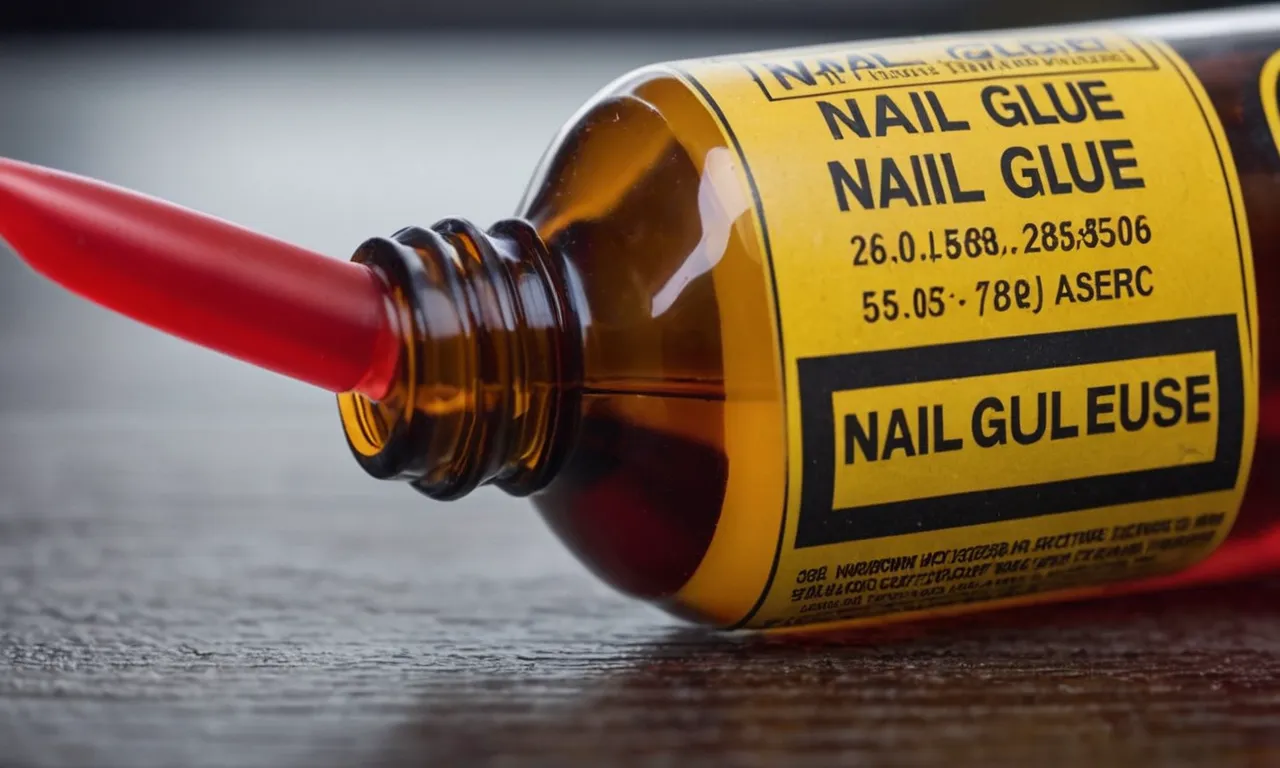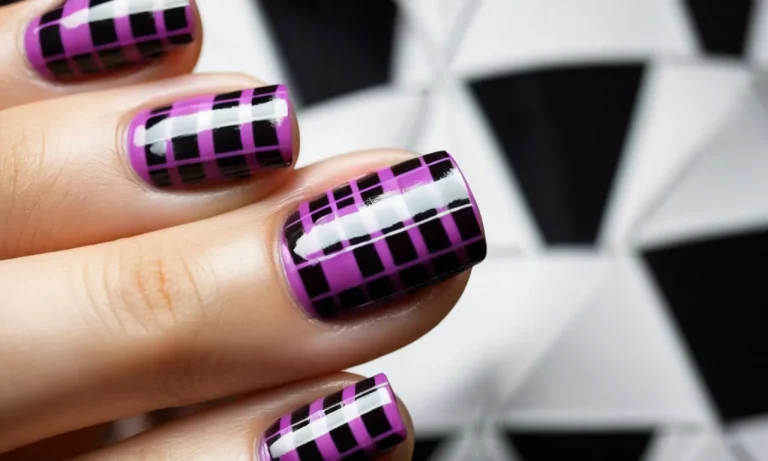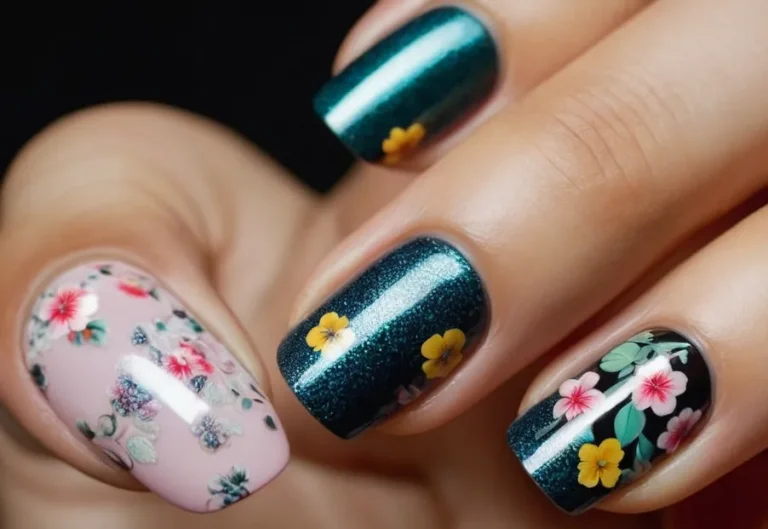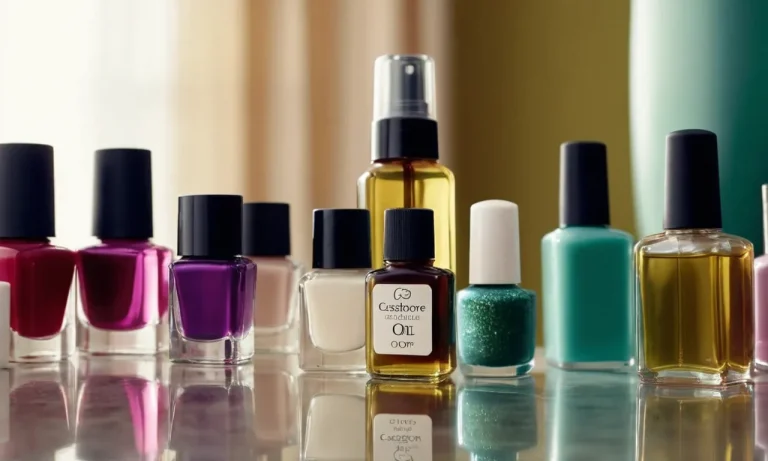Can Nail Glue Kill You? A Detailed Look At The Dangers
Nail glue is a common product that many of us use for quick nail fixes and enhancements. But have you ever wondered – can using nail glue be dangerous? Is it possible for nail glue to kill you? Let’s take an in-depth look at the potential health risks of nail glues.
If you’re short on time, here’s the quick answer: While rare, there are some potential dangers associated with certain ingredients in nail glue. Exposure to large amounts of nail glue fumes over time may cause headaches, dizziness, and irritation.
Some glues also contain chemicals that could be toxic if ingested. Overall, nail glues are considered safe when used as directed, but should be handled with care.
Understanding the Ingredients in Nail Glue
Cyanoacrylates
Cyanoacrylates are the main active ingredients in most nail glues or super glues. They are a fast-acting adhesive that solidifies rapidly when it comes in contact with moisture. The most common type used is ethyl-2-cyanoacrylate.
While safe for minor topical use, ethyl-2-cyanoacrylate can be toxic if ingested or inhaled in large quantities. Some of the side effects linked to cyanoacrylate exposure include severe eye irritation, skin blistering or burns, respiratory irritation, and allergic reactions in sensitive individuals.
Formaldehyde
Some nail glues still contain trace amounts of formaldehyde, a known human carcinogen. Exposure to formaldehyde has been associated with cancer, reproductive issues, and respiratory problems. However, most manufacturers have reformulated their products to be “formaldehyde-free” given the health risks.
Always check the label and avoid nail glues listing formaldehyde, formalin, methylene glycol, or methanal as ingredients.
Acetone
Acetone is a solvent sometimes used in nail products to thin cyanoacrylate adhesives for easier application. At low levels, acetone is considered relatively non-toxic. But exposure to high concentrations can cause headaches, dizziness, eye/nose/throat irritation, and breathing difficulties.
Prolonged skin contact with acetone can also lead to dryness and cracking. People with liver conditions or diabetes may be more susceptible to acetone’s effects. However, many nail glues today are acetone-free.
Plasticizers
Plasticizers are often added to cyanoacrylate adhesives to make them more flexible and prevent cracking. Phthalates like dibutyl phthalate (DBP) used to be common plasticizers but have been mostly phased out due to health concerns.
DBP has been linked to hormone disruption, developmental issues, and cancer risks. Current nail glues use safer plasticizers like tributyl acetyl citrate (TBAC) or Uvinul D 50. While considered less toxic, TBAC may still cause skin irritation at high doses. As with any chemical, moderation is key.
While nail glue is considered relatively safe when used as directed, misuse can lead to adverse health effects. Certain fumes or accidental ingestion may cause temporary irritation or discomfort. Those with multiple chemical sensitivities should check labels carefully or avoid these products altogether.
Proper ventilation, careful application, and keeping glue away from mucous membranes reduce any risks. Overall, nail glue should not kill you, but carelessness in handling such adhesives can lead to avoidable harm in some circumstances.
Potential Health Effects of Nail Glue Exposure
Irritation and Allergic Reactions
Exposure to the chemicals in nail glue can cause irritation, redness, and inflammation of the skin, eyes, nose, throat, and lungs (1). Formaldehyde, toluene, and dibutyl phthalate are common allergens found in nail glues that can trigger reactions in sensitive individuals (2).
Signs of an allergic reaction include rash, itching, swelling, sneezing, coughing, and wheezing. Those with asthma or skin conditions like eczema are at higher risk. Using nail glue in a well-ventilated area and wearing gloves can help minimize exposure and reactions.
Headaches and Dizziness
The strong fumes released from nail glue can cause headaches, dizziness, and lightheadedness (3). This is especially true when working in small enclosed spaces with poor ventilation. The vapors displace oxygen and make it harder to breathe and think clearly.
Opening windows, turning on fans, and taking breaks can lessen these effects. Headaches and altered mental status after using nail glues likely result from inhalation of solvents like toluene, acetone, and formaldehyde (4).
Toxicity if Ingested
Nail glue contains a number of potentially toxic substances like cyanoacrylates, formaldehyde, phthalates, and toluene (5). Accidentally ingesting or drinking nail glue could cause serious harm. Cyanoacrylates can burn and ulcerate the esophagus and stomach.
Phthalates and toluene act as neurotoxins and depress the central nervous system. Formaldehyde is a known human carcinogen. Table 1 summarizes the possible effects of ingesting common nail glue ingredients.
| Ingredient | Potential Effects if Ingested |
|---|---|
| Cyanoacrylates | Esophageal and stomach burns, ulcers |
| Formaldehyde | Carcinogenic, cellular and DNA damage |
| Toluene | Depressed CNS, headache, dizziness, coma |
| Phthalates | Neurotoxic, organ damage with high doses |
If nail glue is ingested, seek medical attention immediately. Do not induce vomiting. Call poison control and follow their instructions. With prompt treatment, the prognosis is often good, but underlying damage may occur with massive ingestions (6).
Keep all nail products out of the reach of children and pets to prevent accidental poisoning.
References:
- https://www.ncbi.nlm.nih.gov/pmc/articles/PMC4606861/
- https://www.aaaai.org/tools-for-the-public/conditions-library/allergies/nail-cosmetics
- https://pubmed.ncbi.nlm.nih.gov/12961083/
- https://www.acsh.org/news/2017/10/11/another-nail-salon-warning-toxic-fumes-can-harm-brain-11934
- https://www.canada.ca/en/health-canada/services/consumer-product-safety/reports-publications/pesticides-environmental-health/environmental-contaminants-regulatory-engagement-priorities/nail-polish-removers-hardeners-adhesives.html
- https://www.poison.org/articles/nail-cosmetics
Precautions for Safe Nail Glue Usage
Work in a Well-Ventilated Area
Working with nail glue in a room with good airflow and ventilation can help reduce your exposure to harmful fumes. Open a window or turn on a fan to keep fresh air circulating. If possible, work outside on a porch or patio. Avoid small enclosed spaces like bathrooms that may trap fumes.
Avoid Contact with Eyes and Mouth
Be very careful not to get nail glue on your eyes or in your mouth, as this can cause irritation, redness, and discomfort. Wearing safety goggles is a smart precaution. Also, don’t bite your nails or put your fingers in your mouth while working with nail glue, as you could ingest small amounts.
Keep Out of Reach of Children
Nail glue can be dangerous if ingested or got into the eyes. Always keep bottles tightly closed and stored up high or locked away when not in use. Educate children that glue is not food or drink and should not be played with.
Follow All Label Directions
Carefully read product labels and follow usage directions. Pay attention to warnings about ventilation, skin contact, flammability, and first aid steps if exposure occurs. Following the manufacturer’s instructions can help prevent accidents and misuse.
Using basic precautions like working in a ventilated room and avoiding eye and mouth contact can go a long way in staying safe with nail glue. Of course, supervision is key for kiddos! Let’s glam up those nails safely and stylishly!
When to Seek Medical Attention for Nail Glue Exposure
Trouble Breathing
If you experience respiratory distress after exposure to nail glue fumes, seek emergency medical care right away. Difficulty breathing can be a sign of a serious allergic reaction or chemical injury to the airways.
Wheezing, gasping, feeling like your throat is closing, or other breathing issues warrant an immediate call to 911 or visit to the emergency room. The doctors will provide oxygen support or medications to open up the airways. Don’t take chances with breathing troubles – get help fast.
Severe Skin Irritation
Nail glue contains ingredients like cyanoacrylates that can irritate and burn the skin. Mild redness or itching may not require medical intervention. However, if you develop hives, swelling, oozing blisters, or peeling skin after nail glue exposure, see a doctor promptly.
Severe skin reactions could become infected or lead to scarring. Your doctor can provide topical steroids, antihistamines, or other treatments to reduce the skin inflammation and discomfort.
Accidental Ingestion
If someone swallows nail glue, call Poison Control (1-800-222-1222 in the U.S.) or go to the ER right away. Consuming cyanoacrylate adhesives is extremely dangerous. The glue can bond to the esophagus, making it impossible to swallow or breathe properly, leading to asphyxiation.
At the hospital, doctors may try to remove the adhesive using endoscopy or give medication to break up the glue. Fatal outcomes have occurred in some cases of ingested nail glue, so don’t take chances – get medical help immediately.
Glue in Eyes
Nail glue in the eye is an ophthalmological emergency requiring prompt medical care. Cyanoacrylate glue causes rapid bonding to eye tissues and can lead to injury and blindness. If glue gets in the eyes, flush them with water for 10-15 minutes while help is on the way.
Do not force eyes open or rub them. At the ER, doctors will likely use topical ointments and eye drops to gently detach glue from eye structures. Follow-up care is crucial to check for corneal damage or vision impairment.
Left untreated, nail glue in the eye can have permanent, devastating consequences.
Safer Nail Glue Alternatives
Water-Based Nail Glues
Water-based nail glues are a great safer alternative to solvent-based glues. The active ingredient is usually acrylic resin suspended in water, rather than toxic chemicals like ethyl acetate or methyl methacrylate. This makes them less likely to cause irritation or allergic reactions.
Some popular water-based nail glue brands include Kiss and Nailene. They provide a strong, long-lasting bond just like traditional glues. However, they have a lower odor and dry clear on the nail. Using them is also less likely to damage or thin the nail over time.
One downside is that water-based glues take a bit longer to dry, so you need more patience. But the safety benefits make this a small trade-off. As long as you’re careful not to get them on your skin or in your eyes, they’re a great non-toxic choice.
Natural Adhesives
For a more natural option, you can look for plant-based nail glues. These use ingredients like tree sap or gum arabic as an adhesive instead of synthetic chemicals.
Some popular natural brands are Probelle and Glee Gum. They provide comparable nail adhesion to regular glues. The natural glues also tend to have a lower odor. However, they can be a bit more expensive than mainstream options.
On the plus side, natural glues are non-toxic and vegan. They’re ideal if you want to avoid ethyl acetate and other strong solvents. Just be aware that plant-based glues may still cause irritation or reactions for those with sensitive skin.
Double-Sided Nail Tape
An alternative to liquid nail glue is using double-sided tape strips. These have adhesive on both sides – you just peel off the backing and stick them to your nail.
Nail tape can hold embellishments very securely. It also avoids fumes or spills from glue bottles. However, it may not last as long as liquid glues. And you’ll need to take extra care not to get the adhesive on your skin or cuticles.
Conclusion
In conclusion, while serious risks are low, nail glues should always be used with care. Certain fumes and chemicals can be hazardous in large amounts. Seek medical help immediately if you experience a severe reaction.
Opting for safer, natural nail glue alternatives can also minimize potential dangers. When used properly and in moderation, common nail glues are generally safe for occasional beauty fixes.







